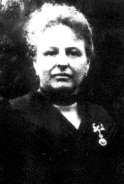Anna Maria Mozzoni

Anna Maria Mozzoni (5 May 1837 – 14 June 1920) was born in Rescaldina in 1837. Regarded by many as a feminist much of her adult life, she is commonly held as the founder of the woman's movement in Italy. One of the roles she is most known for is her pivotal involvement in gaining woman's suffrage in Italy.
Early in her career Mozzoni embraced the utopian socialism of Charles Fourier. She later defended the poor and championed women's equality, arguing that women needed to enter the workplace to develop the female personality outside of the "monarcato patriarcale" (patriarchal family).[1] In 1864 she wrote Woman and her social relationships on the occasion of the revision of the Italian Civil Code (La donna e i suoi rapporti sociali in occasione della revisione del codice italiano), a feminist critique of Italian family law. In 1877 Mozzoni presented a petition to parliament for woman suffrage. In 1878 Mozzoni represented Italy at the International Congress on Women's Rights in Paris. In 1879 she published her translation from English into Italian of The Subjection of Women by John Stuart Mill.[2] In 1881 Mozzoni joined with other republicans, radicals, and socialists in a call for universal suffrage, including woman suffrage. In 1881 she also founded the League for the Promotion of the Interests of Women (Lega promotrice degli interessi femminili) in Milan to promote a variety of causes of interest to women.
See also
Notes
- ↑ Russell, Rinaldina, ed. (1997). The Feminist Encyclopedia of Italian Literature (1st ed.). Westport, Conn. [u.a.]: Greenwood Press. pp. 88–89. ISBN 978-0-313-29435-8.
- ↑ Shepherd, Naomi. "Anna Kuliscioff". Jewish Women's Archive. Retrieved 29 October 2013.
References
- Sunshine for Women. Anna Maria Mozzoni 1837-1920